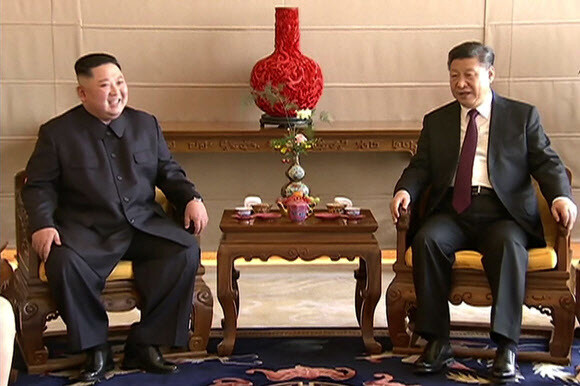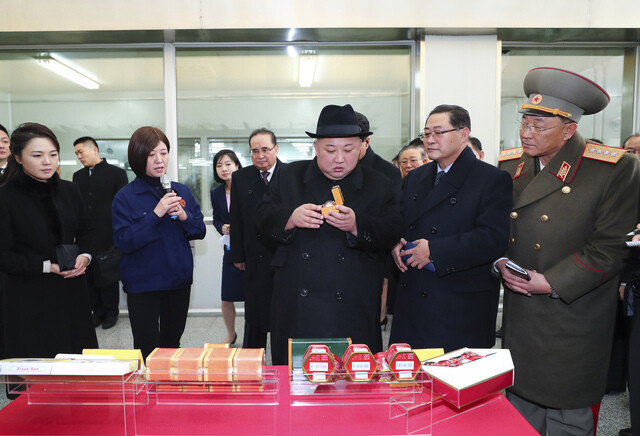hankyoreh
Links to other country sites 다른 나라 사이트 링크
[News analysis] 4th summit between Kim Jong-un and Xi Jinping indicates new phase in NK-China relations

In terms of both content and format, the fourth summit between North Korean leader Kim Jong-un and Chinese President Xi Jinping can be described as a “new leap forward” and a “new honeymoon” declaration in China-North Korea relations, as the two countries celebrate the 70th anniversary of the establishment of diplomatic relations this year. During their summit, the two leaders announced they’d agreed for Xi to officially visit North Korea for the first time since he became president, which is slated to be the biggest event in their bilateral relationship this year.
First of all, the reports on the Korean Central News Agency (KCNA) and Xinhua News on Jan. 10 placed a major emphasis on the extent to which Kim and Xi value China-North Korea relations.
The KCNA described the two sides’ relationship as a “trusting comradeship supported by the most faithful and rugged roots in this world, an invincible friendship that remains steadfast in any storm.”
Xi himself said that the “China-North Korea relations have opened a new chapter in history.”
In addition to this, Kim sent a strong signal about boosting China’s influence over Korean Peninsula issues by emphasizing China’s role in various areas, including North Korea-US denuclearization talks, economic development and improving the public livelihood.
Whereas last year North Korea and China focused on the protocols of ordinary intergovernmental relations, this time they emphasized the traditional special relationship between the two ruling parties, sending the message that the intergovernmental and interparty relationships had been fully restored. Such intentions were manifest in Kim traveling 19 hours on his personal train, which is a symbol of North Korea and China’s traditional amity, instead of flying on his personal plane, called Chammae-1, meaning “goshawk”; having lunch at the Beijing Hotel, a former favorite of his grandfather and former North Korean leader Kim Il-sung; having his visit to China announced not by North Korea’s Foreign Ministry but by the Workers’ Party of Korea’s Foreign Liaison Department, which handles interparty relations; and emphasizing party titles rather than government titles in that announcement.
“This goes beyond showing that North Korea has coordinated its negotiating strategy with China prior to the North’s talks with the US. Chairman Kim is showing that his ‘new way’ and ‘plan B’ mean he’ll move forward with China in the event that the negotiations with the US don’t work out,” said Cho Sung-ryul, senior research fellow for the Institute for National Security Strategy.

China focuses on US issues while trying to reassert influence over Korean Peninsula
And considering that Xi’s visit to North Korea, originally planned for Sept. 2018, has been continuously delayed for reasons including friction between the US and China, the fact that Xi has formally agreed to visit the North for the first time since coming to power appears to carry particular significance for China-North Korea relations and also for Kim’s rule. But while North Korea gave detailed coverage to Xi accepting the invitation to the North, reports in China didn’t make a single mention of Xi’s potential visit.
In light of this, China will probably decide on the timing of Xi’s visit to North Korea in consideration of North Korea-US negotiations about denuclearization and corresponding measures and the status of China-US relations.
“Despite its conflict with the US, China is attempting to recover its influence on the Korean Peninsula by strengthening relations with North Korea and by restoring relations with South Korea,” said Cho Sung-ryul, who predicted that Xi could visit Pyongyang in the first half of the year, following the North Korea-US summit, and then visit Seoul in the second half of the year.
Given the practical consideration that China’s strategic focus is on the US as their trade dispute continues, Xi may not end up visiting North Korea until the second half of the year, some predict.
“China will take care to ensure that its ties with North Korea don’t function as an obstacle or source of friction during its negotiations with the US. China will focus on managing its relations with North Korea and has no reason to rush a visit to the North,” said Kim Han-kwon, a professor at the Korean National Diplomatic Academy. Kim predicted that China will wait to schedule its visit until it has seen the outcome of the second North Korea-US summit, with the possibility of scheduling the visit as late as Oct. 6, the 70th anniversary of China and North Korea’s establishment of diplomatic relations. Other factors that could affect the timing of Xi’s reciprocal visit to the North are the possibility of China inviting Kim to attend the 70th anniversary of China’s National Day on Oct. 1 and the schedule of the 40th anniversary celebration of diplomatic relations between the US and China, which was delayed because of the trade dispute.
By Park Min-hee, staff reporter
Please direct comments or questions to [english@hani.co.kr]

Editorial・opinion
![[Column] Park Geun-hye déjà vu in Yoon Suk-yeol [Column] Park Geun-hye déjà vu in Yoon Suk-yeol](https://flexible.img.hani.co.kr/flexible/normal/500/300/imgdb/original/2024/0424/651713945113788.jpg) [Column] Park Geun-hye déjà vu in Yoon Suk-yeol
[Column] Park Geun-hye déjà vu in Yoon Suk-yeol![[Editorial] New weight of N. Korea’s nuclear threats makes dialogue all the more urgent [Editorial] New weight of N. Korea’s nuclear threats makes dialogue all the more urgent](https://flexible.img.hani.co.kr/flexible/normal/500/300/imgdb/original/2024/0424/7317139454662664.jpg) [Editorial] New weight of N. Korea’s nuclear threats makes dialogue all the more urgent
[Editorial] New weight of N. Korea’s nuclear threats makes dialogue all the more urgent- [Guest essay] The real reason Korea’s new right wants to dub Rhee a founding father
- [Column] ‘Choson’: Is it time we start referring to N. Korea in its own terms?
- [Editorial] Japan’s rewriting of history with Korea has gone too far
- [Column] The president’s questionable capacity for dialogue
- [Column] Are chaebol firms just pizza pies for families to divvy up as they please?
- [Column] Has Korea, too, crossed the Rubicon on China?
- [Correspondent’s column] In Japan’s alliance with US, echoes of its past alliances with UK
- [Editorial] Does Yoon think the Korean public is wrong?
Most viewed articles
- 1[Column] Park Geun-hye déjà vu in Yoon Suk-yeol
- 2Will NewJeans end up collateral damage in internal feud at K-pop juggernaut Hybe?
- 3N. Korean hackers breached 10 defense contractors in South for months, police say
- 4Why Korea shouldn’t welcome Japan’s newly beefed up defense cooperation with US
- 5[Guest essay] The real reason Korea’s new right wants to dub Rhee a founding father
- 6Thursday to mark start of resignations by senior doctors amid standoff with government
- 7[Editorial] New weight of N. Korea’s nuclear threats makes dialogue all the more urgent
- 8The dream K-drama boyfriend stealing hearts and screens in Japan
- 9Kim Jong-un expressed ‘satisfaction’ with nuclear counterstrike drill directed at South
- 10Terry Anderson, AP reporter who informed world of massacre in Gwangju, dies at 76